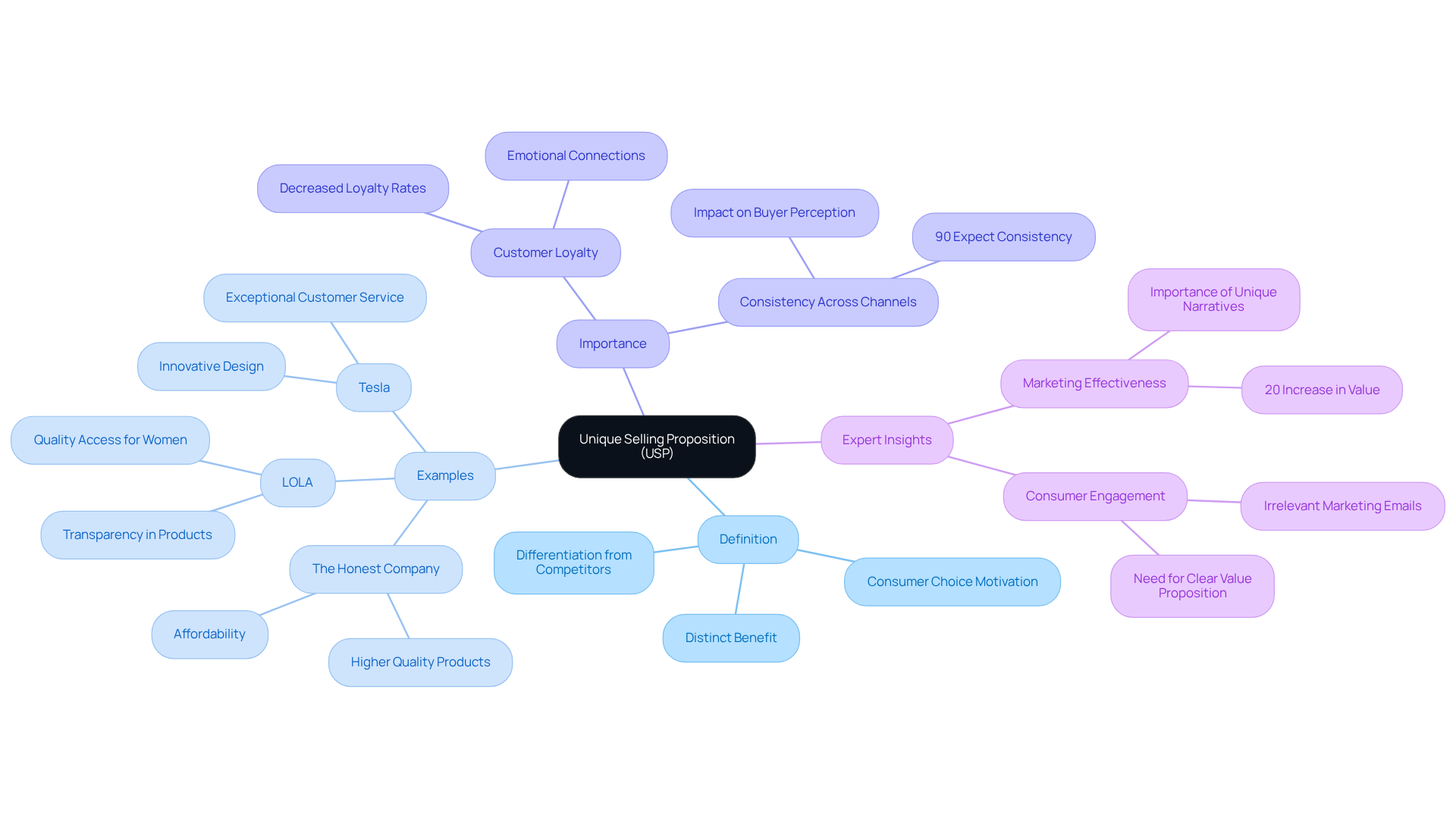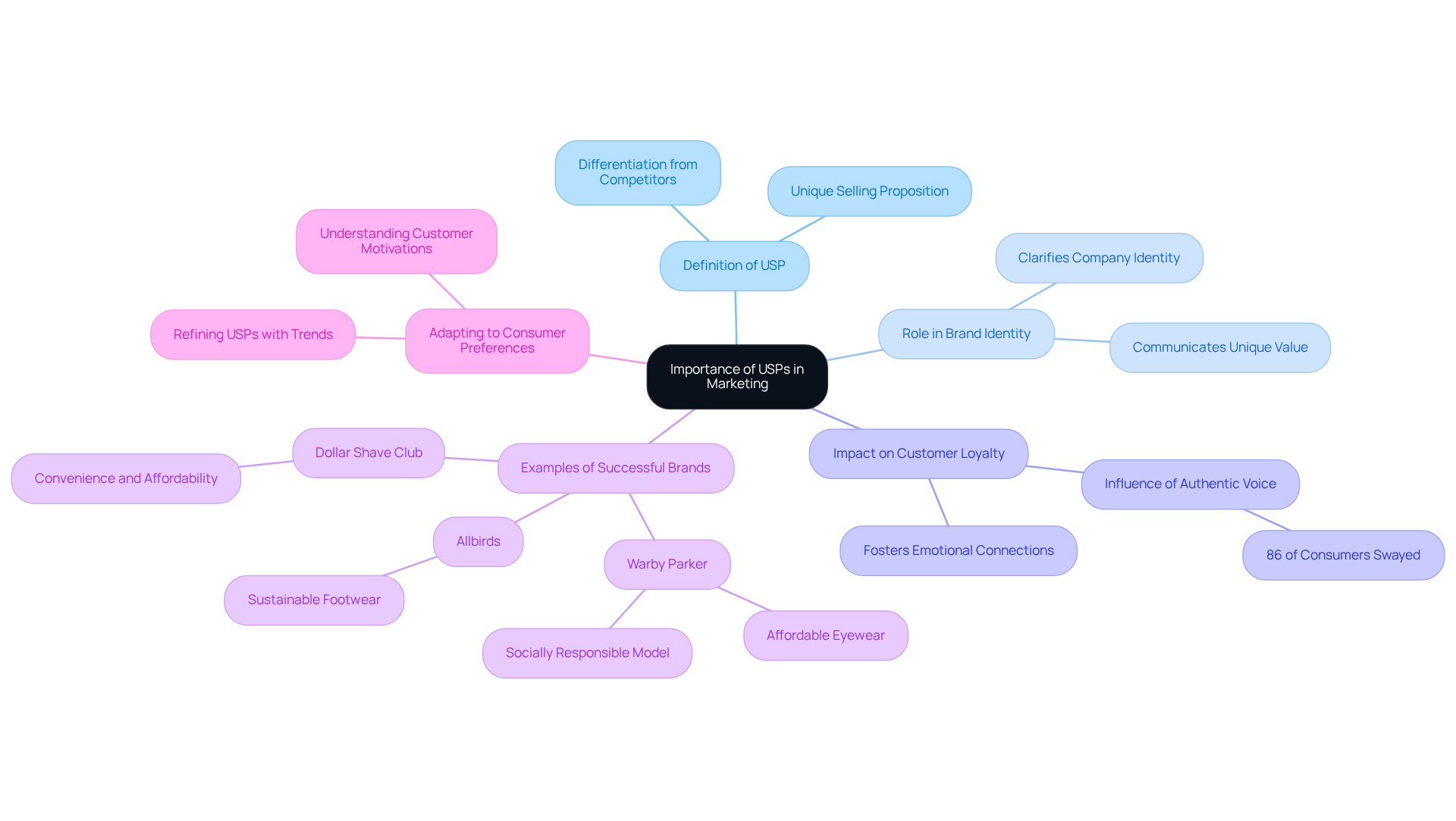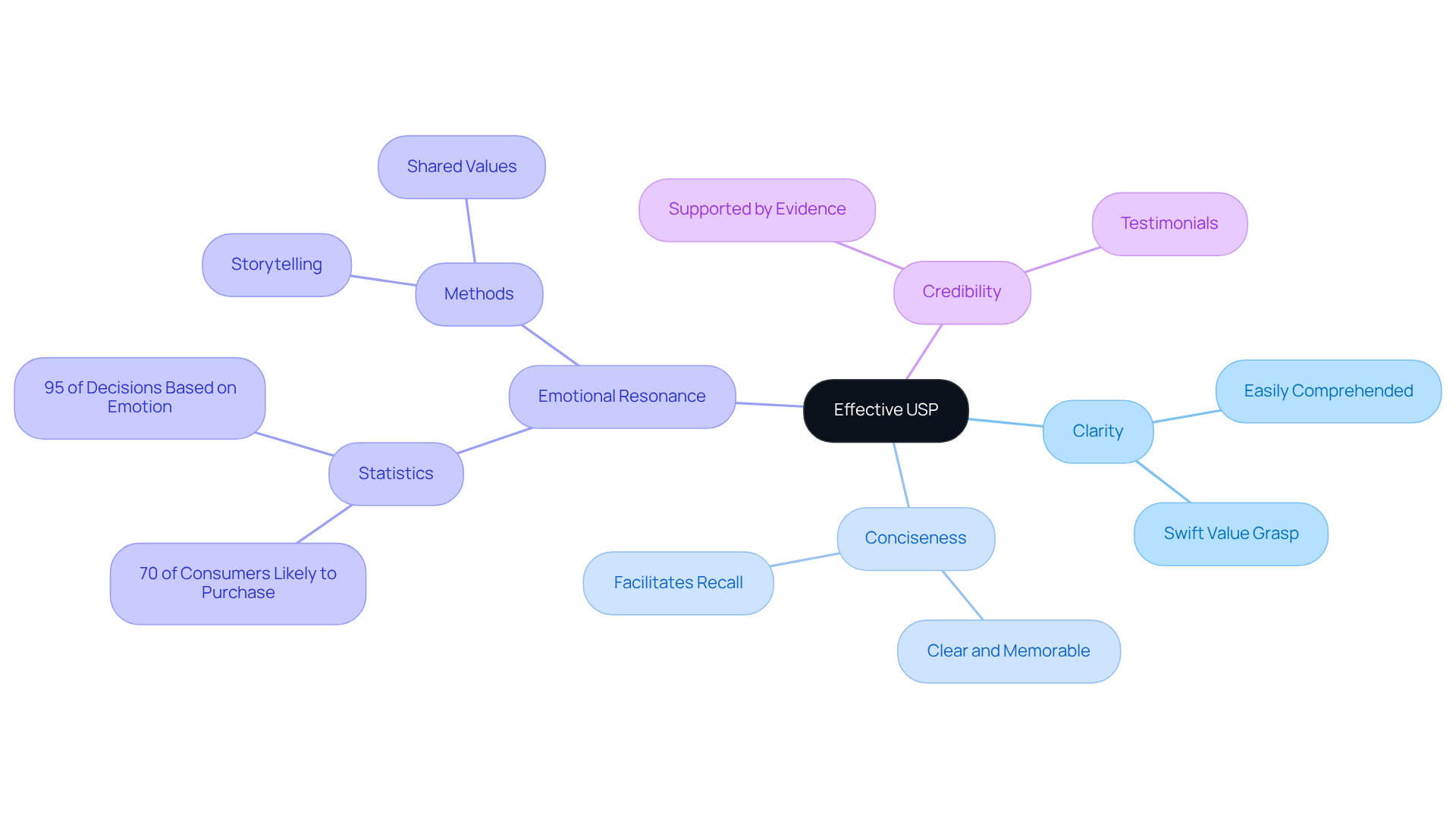
Overview
The article elucidates the meaning and significance of Unique Selling Propositions (USPs) in marketing, particularly for direct-to-consumer (DTC) brands. A well-defined USP is not merely beneficial; it is essential for distinguishing a brand in a competitive marketplace. By clearly articulating unique benefits that resonate with consumers, a strong USP fosters loyalty and drives sales. This foundational element of marketing strategy is paramount for brands seeking to thrive in an increasingly crowded field.
Introduction
Understanding the Unique Selling Proposition (USP) is crucial for direct-to-consumer (DTC) brands navigating a crowded marketplace. A well-defined USP not only differentiates a brand but also resonates with consumer values, fostering loyalty and driving sales.
However, with consumer preferences constantly evolving and attention spans dwindling, brands must ask themselves: how can they ensure their USP stands out and effectively influences purchasing decisions? This inquiry is not merely academic; it is essential for survival in an increasingly competitive landscape.
Define Unique Selling Proposition (USP)
The concept of USP meaning marketing is pivotal, as it defines the distinct benefit or feature that differentiates a product or service from its competitors. It serves as a clear declaration, informing consumers why they should choose one brand over another. For direct-to-consumer (DTC) companies, a well-articulated USP is indispensable for differentiation in a saturated marketplace, ultimately fostering customer loyalty and driving sales.
DTC companies such as The Honest Company, LOLA, and Tesla exemplify the successful implementation of USPs by emphasizing unique qualities like superior product quality, innovative design, and exceptional customer service. These brands have effectively engaged customer interest by addressing specific challenges and aligning their offerings with client values.
The significance of a USP meaning marketing cannot be overstated; it not only helps in differentiating a brand but also plays a crucial role in influencing buyer perceptions. Almost 90% of customers expect a consistent experience across channels, making it essential for DTC brands to clearly convey their distinct value propositions. Furthermore, as customer loyalty continues to wane—falling from over 75% to merely 67%—brands must leverage their USPs to build trust and emotional connections with their audience.
Expert insights underscore that a robust USP meaning marketing can significantly enhance marketing effectiveness. Brands that consistently communicate their unique narratives can see a 20% increase in value, illustrating the financial advantages of a well-defined USP. In a landscape where 44% of consumers deem most marketing emails irrelevant, a compelling USP can capture attention and drive engagement, making it an essential component of any successful DTC marketing strategy.

Explain the Importance of USPs in Marketing
The importance of a Unique Selling Proposition (USP) in marketing, or USP meaning marketing, cannot be overstated, especially for direct-to-consumer (DTC) companies. A robust USP meaning marketing serves as the foundation of a company's marketing strategy, clearly defining its messaging and positioning within the marketplace. It not only clarifies the company's identity but also effectively communicates its unique value to potential customers.
In a landscape overflowing with options, understanding the USP meaning marketing provides a compelling answer to the critical question: 'Why should I choose this brand?' This clarity is vital; studies reveal that 86% of shoppers are swayed by an authentic voice in their purchasing decisions. A well-articulated USP meaning marketing can cut through the noise, fostering loyalty and improving customer retention.
Furthermore, as consumer preferences evolve, DTC companies must refine their USPs meaning marketing to ensure they align with contemporary trends and resonate with their target audience. For example, brands like Warby Parker and Allbirds have adeptly leveraged their USPs to not only differentiate themselves but also to drive substantial market growth. By focusing on what distinguishes them, these companies have forged strong emotional connections with customers, ultimately influencing their buying decisions and highlighting the significance of USP meaning marketing in today’s competitive environment.

Identify Key Characteristics of an Effective USP
An effective Unique Selling Proposition (USP), meaning marketing, embodies several critical characteristics: clarity, conciseness, emotional resonance, and credibility. Clarity guarantees that the message is easily comprehended, enabling individuals to grasp the brand's value swiftly. Conciseness maintains the USP clear and memorable, facilitating easier recall for customers. A strong USP meaning marketing must emphasize a unique benefit that competitors do not provide, addressing the specific needs of the target audience.
Emotional resonance plays a pivotal role in enhancing the impact of a USP. Research indicates that 70% of consumers who experience a strong emotional reaction to an advertisement are significantly more likely to make a purchase. This connection can be established through storytelling or by tapping into shared values, which nurtures a deeper relationship between the entity and its audience. In fact, 95% of purchasing decisions are based on emotion, highlighting the necessity of emotional engagement in USPs.
Furthermore, credibility is crucial; a persuasive USP meaning marketing should be supported by evidence or testimonials that reinforce the company's claims. For example, companies such as Domino's Pizza have effectively distinguished themselves by assuring rapid delivery, which directly met customer expectations and established trust. As Ashley Deland observes, a strong USP meaning marketing is more than a persuasive statement; it’s the defining characteristic that sets a company apart from its competitors. By ensuring that a USP is clear, concise, emotionally engaging, and credible, companies can effectively convey their distinct value and stand out in a competitive market.

Provide Examples of Successful USPs
Unique Selling Propositions (USPs) are pivotal across various industries, as their USP meaning marketing serves as a cornerstone of effective branding. Consider FedEx's compelling USP: 'When it absolutely, positively has to be there overnight.' This statement underscores the company's unwavering commitment to reliability and speed—qualities that are paramount for their clientele. Similarly, M&M's engaging USP, 'Melts in your mouth, not in your hand,' highlights a unique product characteristic that captivates consumers and sets the brand apart in a competitive market.
Another notable example is TOMS Shoes, which adopts the impactful USP 'One for One.' This proposition not only conveys the brand's mission but also assures customers that their purchase contributes to a greater cause—specifically, that for every pair bought, a pair is donated to someone in need. These instances exemplify how a well-articulated USP meaning marketing can effectively communicate a brand's unique value proposition, resonating with consumers and fostering both sales and brand loyalty.
In summary, these successful USPs illustrate the power of clearly defined messaging in driving consumer engagement and establishing a brand's identity. By emphasizing reliability, distinctive product features, and social responsibility, brands can forge strong connections with their audience, ultimately enhancing their market presence.

Conclusion
Understanding the unique selling proposition (USP) is paramount for direct-to-consumer (DTC) brands aiming to stand out in a saturated marketplace. A well-defined USP not only underscores a brand's unique benefits but also cultivates customer loyalty and drives sales by articulating clearly why consumers should favor one brand over another. This clarity is vital for DTC companies, as it constitutes the foundation of their marketing strategies and facilitates deeper connections with their target audiences.
Throughout this article, we have explored various facets of USPs, including their critical role in enhancing brand identity, shaping consumer perceptions, and propelling market growth. Successful brands such as The Honest Company, Tesla, and TOMS Shoes exemplify how effective USPs resonate with customers, foster emotional ties, and ultimately boost sales. Moreover, we have highlighted the essential characteristics of a compelling USP—clarity, emotional resonance, and credibility—crucial for capturing consumer attention and driving engagement.
In an increasingly competitive environment where consumer preferences are perpetually shifting, the significance of a robust USP cannot be overstated. Brands must not only articulate their unique propositions but also adapt them to harmonize with evolving market trends and customer values. By doing so, they can build trust and loyalty among consumers, thereby enhancing their overall market presence. Embracing the power of a well-defined USP is essential for DTC brands aspiring for success, making it imperative to invest time and resources in crafting a proposition that genuinely reflects their unique value in the marketplace.
Frequently Asked Questions
What is a Unique Selling Proposition (USP)?
A Unique Selling Proposition (USP) is the distinct benefit or feature that differentiates a product or service from its competitors, informing consumers why they should choose one brand over another.
Why is a USP important for direct-to-consumer (DTC) companies?
A well-articulated USP is crucial for DTC companies to differentiate themselves in a saturated marketplace, foster customer loyalty, and drive sales.
Can you provide examples of companies that successfully implement USPs?
Companies like The Honest Company, LOLA, and Tesla successfully implement USPs by emphasizing unique qualities such as superior product quality, innovative design, and exceptional customer service.
How does a USP influence buyer perceptions?
A USP helps in differentiating a brand and plays a crucial role in influencing buyer perceptions, as consumers expect a consistent experience across channels.
What statistics highlight the importance of a USP in marketing?
Almost 90% of customers expect a consistent experience across channels, and brands that communicate their unique narratives can see a 20% increase in value. Additionally, customer loyalty has decreased from over 75% to 67%.
How can a compelling USP affect marketing effectiveness?
A compelling USP can capture attention and drive engagement, making it an essential component of any successful DTC marketing strategy, especially in a landscape where 44% of consumers find most marketing emails irrelevant.
FAQs











